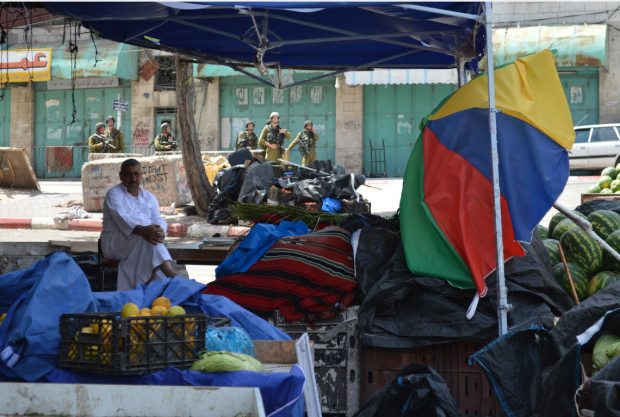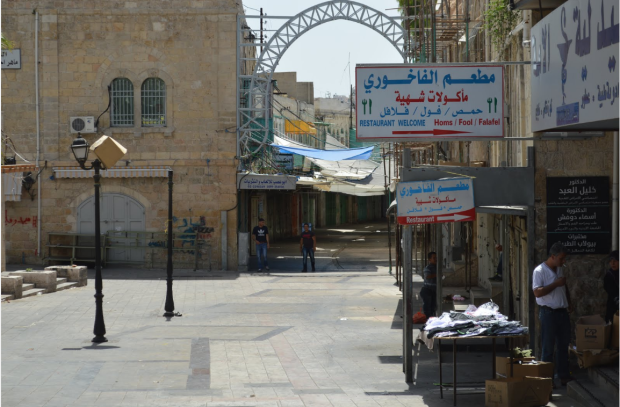Crack down on Hebron intensifies, residents feel under siege
Amira Shaabal and a group of her classmates were standing outside their school, huddled over notebooks trying to cram for their final exam, when the tear gas started. Shabaal is from a small village in the southern occupied West Bank district of Hebron, which, like the rest of the Hebron governorate, has been under tight security for the past three days in response to the reported kidnapping of three Israeli teenagers near the highly controversial Gush Etzion settlement block on Friday.
Normal life in Hebron has since come to a halt. Checkpoints are set up at the entrance of every neighbourhood, Israeli soldiers stand on street corners and it is nearly impossible for anyone from Hebron to leave the city or governorate since Israel’s Ministry of Defense declared a lockdown on the city late Saturday night. Shabaal said her village has experienced overnight raids on houses for the last two nights.
“It’s hard to work like this,” Shaabal said holding her hand out towards the thick clouds of tear gas that had just been fired about 30 meters behind her. “I’m expected to take my final exams like this? The whole city is blocked, all the businesses are closed, we can’t sleep. It’s chaos in my city now.”
There have been problems for students at the local universities also, including the largest, Hebron University. A spokesperson for the university stated that they were keeping many departments of the university open, but some may close in the coming days as many students that live outside Hebron are missing classes because they are unable to reach the city due to the heightened military situation.
Hebron is no stranger to violence, and has long played host to a large military presence. A highly controversial settlement, deemed illegal under international law, is located at the heart of the city and guarded by hundreds of Israeli soldiers.
Yet, over the last three days this presence has intensified. The main road north is now being manned by soldiers and armed jeeps. Between Hebron and Bethlehem, a distance of around 25 kilometers, there were five noticeable flying checkpoints. The government has even gone as far as calling up reservists for further deployment in the West Bank.
Because of this, reports began circulating in Arabic media that the closures may extend to the Greater West Bank if the three missing teenagers are not found soon. The complete closure is limited to Hebron at the moment, but like the main road from the city to Bethlehem, flying checkpoints are being installed throughout the West Bank. Overnight on Sunday, the main roads in Bethlehem and surrounding areas were closed off as well, although they have since been reopened.
An offshoot of the Islamic State in Iraq and the Levant (ISIL) took responsibility for the reported kidnappings on Friday 13 June, however the Israeli authorities have repeatedly stressed that they holds Hamas responsible. Hamas has denied these claims.
After years of division, Hamas, which rules Gaza, and Fatah, which governs the West Bank, earlier this month announced the formation of a unity government, which caused widespread outrage in Israel. Israel deems Hamas a terrorist organisation and is now mulling expelling Hamas leaders from the West Bank.
No end in sight
As the search for the three Israeli settlers nears the end of its fourth day, there are still no apparent leads on the teenagers' whereabouts and it appears the closure of Hebron may continue for the foreseeable future.
On Monday, the streets of Hebron were far less busy than they would be on a routine bustling workday. There are no tourists because of the security crackdown on the city, and in the midst of everything many shops are closed because their owners are protesting in solidarity with hunger-striking Palestinian prisoners in Israeli jails.
Residents were keen to speak to Middle East Eye about what many are regarding as a ‘siege’ on their city, the clashes happening on the streets of Hebron during the day, and the overnight arrests and raids that have become a routine aspect of the night.
“The Israelis are trying to make a collective punishment on everyone,” Hebron Peace Centre employee Ayman Khahoura said. “By closing all the entrances to the city, they have put us under a siege and have made life very difficult. My house is surrounded by Israeli checkpoints, more now than before, in my village there was much army aggression last night, they arrested lots of normal people. This was the same for many villages around Hebron.”
No one appears to know how long the situation will last. The fear for many in Hebron is that as days go past without any new information on the whereabouts of the missing teenage settlers, the harsher the restrictions and the more aggressive the clashes will become. Talal al-Khalili, who lives in the village of Luza in the Hebron district, makes a living giving tours to visitors in Hebron. MEE found him near the entrance of the famous souq (market) in the city centre, now empty, and only meters from clashes between the city’s youth and Israeli soldiers.
“How long the city will be closed, I don’t know, nobody knows,” al-Khalili said. “Already they [youth] are throwing stones, and the army are firing. Yesterday night they raided my village. They also injured three people last night when blowing open the door of a house in the middle of the night. I don’t know what is going to happen, but now it is not good for me, I don’t have money coming in, and I don’t know when I will. I’m sure the tourists are scared to come here now.”
Such a closure could have a devastating effect on the economy of Hebron if it continues. With an unemployment rate of 20.1 percent in the West Bank, families often rely on certain individuals earning a steady wage to keep family finances afloat. This is the case particularly in Hebron, where the unemployment rate has been several percent higher than average for several years according to data from the Palestinian Central Bureau of Statistics.
The effects reach further than Hebron. Despite the high unemployment level, Hebron has many factories, and is known for supplying goods to the West Bank. Hebron residents also travel to other cities for work, however, businesses in the West Bank that employ Hebronites are now missing workers.
Osama Khawaja owns a dry cleaning business in Bethlehem. Due to the closure, he has been unable to open his business because the majority of his employees are from Hebron.
“My business is in Bethlehem, but I have eight employees that are from the Hebron area and now they can't get to work because of this. Most of them are from around Hebron. If my employees can’t come I will be closed, and every day I am closed I will lose $2,000,” Khawaja told MEE.
For now, Bethlehem remains open, but the people of Hebron are stuck in a limbo, unsure of Israel’s next move, and tensions are escalating. In the last 24 hours, Gaza and Israel have continued to exchange rockets, 150 Palestinians have been detained, a young Palestinian man was shot dead by the IDF in Ramallah, and a drive by shooting took place against an Israeli army base in Bethlehem governorate.
The increase in tension is not lost on Hebron residents, who are essentially cut off from the rest of the area. If the current situation is not resolved, some expect history to repeat itself.
“Violence will lead to violence, and I think these things might lead to a third intifada,” Khahoura said.
Stay informed with MEE's newsletters
Sign up to get the latest alerts, insights and analysis, starting with Turkey Unpacked
Middle East Eye delivers independent and unrivalled coverage and analysis of the Middle East, North Africa and beyond. To learn more about republishing this content and the associated fees, please fill out this form. More about MEE can be found here.



